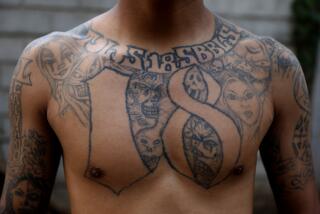‘70s SLA Fugitive Pleads Not Guilty to U.S. Charges
- Share via
SAN FRANCISCO — Symbionese Liberation Army foot soldier James W. Kilgore was arraigned in U.S. District Court here Friday, ending a quarter-century on the run from his past as a violent 1970s political dissident.
Dressed in a pea-green lockup jumpsuit covered by a brown jacket, the 55-year-old Kilgore looked stiff and said little as he pleaded not guilty to explosives charges and other counts before U.S. Magistrate Bernard Zimmerman.
Guarded by U.S. marshals, Kilgore arrived Thursday from Cape Town, South Africa, where he was arrested last month while leading a fugitive’s life as a national activist and university professor.
He was ordered held without bail, and is scheduled to appear in court again Jan. 6.
Kilgore smiled briefly at several friends in the hushed courtroom, among them William Harris, a fellow member of the radical leftist group, who appeared to offer emotional support.
Kilgore and Harris were members of the extremist group that kidnapped newspaper heiress Patricia Hearst and participated in a 1975 bank robbery in which a 42-year-old homemaker, Myra Opsahl, was killed while depositing money from a church collection.
Two decades after their crimes, Harris and three other members of the group -- Emily Harris Montague, Michael Bortin and Sara Jane Olson -- pleaded guilty last month to Opsahl’s murder under an agreement in which each will face no more than eight years in prison. Harris is free on bail. Kilgore’s attorney, Louis Freeman, said Friday that state prosecutors had offered his client a similar deal.
Kilgore was arrested in South Africa just one day after the other four entered their plea agreement, a turn of events U.S. prosecutors say was a coincidence.
The U.S. attorney’s office has yet to offer any deal on two federal indictments faced by Kilgore, who lived for years in a Cape Town suburb under the alias Charles William Pape.
Kilgore had been on the run since 1975. He vanished shortly before he was indicted on two counts of allegedly possessing a destructive device after authorities recovered explosives at a Symbionese Liberation Army hide-out near San Francisco.
Last month, Kilgore also was indicted on a charge of making false statements in connection with a passport application.
If convicted, he faces 10 years’ imprisonment and a $10,000 fine on the bomb charge and another five years and a $250,000 fine on the passport charge. He must face the federal explosives indictment before answering the state’s murder charge.
In the courtroom Friday, Kilgore responded to questions from Judge Zimmerman in a low voice. When asked for his identity, he replied, “James William Kilgore, your honor.” And when asked his age, he hesitated and responded, “Um, 55.” To which the judge retorted: “Certainly not a juvenile.”
In requesting that Kilgore be held without bail, U.S. Atty. Kevin Ryan called the ex-fugitive “an extreme flight risk and an extreme danger to society.” Lawyers representing Kilgore have disputed that characterization, saying their client was surrendering to authorities when he was taken into custody at his suburban home by South African authorities.
The last of the known Symbionese Liberation Army members to emerge from hiding, Kilgore was raised in Marin County, and graduated from UC Santa Barbara in 1969 before hooking up with the radical group.
After fleeing the U.S. in 1975, Kilgore taught school in Zimbabwe and earned a doctorate through correspondence courses.
He spent several years as a neo-Marxist researcher and activist, gaining a reputation for raw energy and vision. More recently, he was an instructor at the University of Cape Town.
In attendance at the court hearing were two American college professors who knew Kilgore as “John Pape,” a committed South African activist and member of the South African National Congress.
Roxanne Dunbar Ortiz, an ethnic studies professor at Cal State Hayward, knew Kilgore; the fugitive’s American wife, Terry; and the couple’s two sons while living in South Africa. She said she was disappointed in the South African and American governments.
“Especially in the new South Africa, a nation where truth and reconciliation is now the norm, he should have been given amnesty years ago. It should have happened in the Carter administration,” she said.
A UC Santa Cruz instructor, Frank Wilderson III, said he had worked on numerous causes with Kilgore, and questioned the decision by the South African government to participate in his capture.
“I know this man as a South African hero,” he said outside the courtroom. “And this is no way for any country to treat one of its heroes.”
More to Read
Sign up for Essential California
The most important California stories and recommendations in your inbox every morning.
You may occasionally receive promotional content from the Los Angeles Times.











